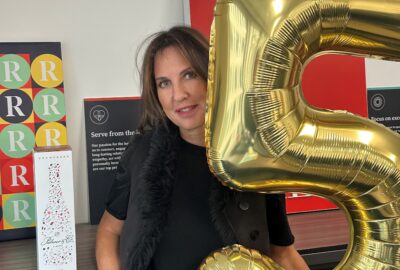
Ahead of our epic team fundraiser next week, the Spurs Dare Skywalk, we caught up with Neil Kirby, founder of the Red Rubber Ball Foundation, one of the charities we are raising much needed funds for.
You founded the charity, Red Rubber Ball Foundation in 2010. Can you please tell us how it all started and why you got involved in helping children in Kenya with their education?
I had seen some photos of a friend of mine who was helping a small village in Kenya, sending them a little money when he had some spare. He mentioned a group of orphan children who had no-one to look after them and didn’t eat regularly. I offered to do some fundraising to convert a small piece of land to grow maize to feed them.
I went out to Kenya to make sure the land and orphan existed and was told about the problems kids have attending secondary school.
Is it right that families must pay for secondary education in Kenya? So for many children their education stops at 11. How does this impact on their lives and their future?
Yes. Many children now complete primary school (which is free) but struggle when it comes to secondary. All secondary schools charge fees, including boarding fees as most schools are single-sex boarding. This is because of the distances that children travel to school and if they live at home, they miss school because they’re needed to do chores and farming at home.
When their family can’t afford the fees, they are not admitted at all or get excluded from school. The average income for an unskilled worker who hasn’t completed school can be as little as £40 a month. That’s simply not enough to live on, let alone save for things like school fees.
For young girls its even worse. They will often be married off (sometimes to an older man they don’t know) at 12 or 13 years old. Completing school can mean that they get to chose who they marry, perhaps after university or college.
What does life look like for children who aren’t lucky enough to have a secondary education?
Its grim. They will end up living in a slum area of a major city or in a rural village. Either way they will probably be doing domestic housekeeping, selling vegetables or second-hand clothes, labouring or hustling on the street. They won’t have a regular income, which is very stressful. They merely survive.
Since the charity started, how many children have been helped?
265 children have been given scholarships to secondary school. Of these 112 are in school this year, with 153 having already completed school. Of these, 66% have gone on to university or college. That compares to just 3% nationally.
We also run a cycling club as an out-of-school project in one secondary school which has over 120 children taking part and have 30 primary school children attending our original farming project to grow their own vegetables. The farm has become a base for training adults too in agriculture like fish, poultry, and bee-keeping that can earn higher income.
What’s the biggest change that you’d like to see from the Kenyan government to better support the education system?
The key one would be to make secondary education free. At the moment the Ministry of Education pays around £150 a year for each child in secondary school. It’s less than half the actual cost to schools. It means the parents are asked to pay and when many cant, either we step in or the child misses school.
What are the charity’s proudest moments so far?
There are many. Two different examples are Moses, who completed university and in response to the COVID outbreak set up a community group in the Kibera slums of Nairobi to provide food vouchers to families unable to eat. It was run by local volunteers and saved thousands of families.
And Getrude will always be special to us. Her father is a drunk and her mother is disabled, so they had limited income. She faced being married off, but we were able to find a sponsor. She attended a village secondary school and achieved a B+ at the end of her four years. It secured her a place at university, where she graduated with a First in Public Policy. She’s now a qualified Public Health Officer. All she needed was the chance to complete school.
Neil, you visit Kenya every year to see the children you support. You’ve personally raised thousands of pounds from running marathons, sponsored bike rides and much more which has changed the lives of so many children. What keeps you inspired and motivated to keep going every year?
Yes, we’ve now raised over £½ million and things can become frustrating. We’ve paid out fees to over 160 different secondary schools and it can often take time to get things done and communicating with the schools can be difficult. But it's lovely when we get news, letters or photos of the children and hear the things they’re doing now. In fact, I covered my office wall with letters, reports and photos of the children. It’s a lovely daily reminder why I’m doing it.
What’s the biggest lesson you’ve learned from the work the charity does?
I think probably that you don’t always need a clear plan. I didn’t actually set out to run a scholarship programme. The idea was just to help a few orphan children – and I responded to the situation I saw around me. I just did what I could to help and each year we’ve given more and more scholarships. As these grew, we adapted, developed polices and changed the way we work. I do things purposefully … and I’m flexible.
What’s your favourite quote / life mantra you go by?
This is an easy answer – 'anything is possible … if you put your mind to it’. It’s the mantra I live by and that I share with the children in Kenya, but also people everywhere. Its amazing what YOU CAN achieve IF you apply yourself. Try things out, put in a lot of effort, and ask if you don’t know.
And what if things go wrong or don’t work out?
If you are ambitious, then its inevitable that this will happen. Failure comes from trying new things. And it’s a crucial part of learning. My very first fundraiser was an attempt to climb Mont Blanc. I’m not a mountaineer but it seemed possible and would be a great adventure.
We got to within 400m of the summit when we had to turn back. And of course, the first question everyone asked when I got home was “did you make it to the top?”. And I had to say “no”. I was bitterly disappointed, but soon realised that I’d done my best. And most importantly I’d got home safely, so if it was important to me I could get fitter, learn better technique and try again. It motivated me to do more.
If you could listen to one song or watch 1 movie for the rest of your life, what would it be?
I’d have to say ‘Delicatessen’ a slightly off-beat French dark comedy. It’s a bit like Sweeney Todd of a butcher who rents out rooms and kills the tenants when they can’t pay their rent. One particular tenant falls for the butcher’s daughter and is ultimately rescued by a rebel group of vegetarians. Its funnier than it sounds! And it is very quirky and unconventional.
For further information on scholarships, please click here: https://www.redrubberball.org....
To sponsor team RedLaw, please click here: https://www.justgiving.com/cro...


